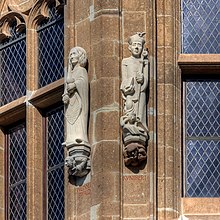Cunibert
St. Cunibert | |
|---|---|
 Statue of Kunibert on the tower of Cologne City Hall | |
| Feast | November 12 |
Saint Cunibert, Cunipert, or Kunibert (c. 600 – 12 November c. 663) was the ninth Bishop of Cologne from 627 to his death. Contemporary sources only mention him between 627 and 643.
Life
Cunibert (also spelled 'Honoberht') was born somewhere along the Moselle to a family of the local Ripuarian Frankish aristocracy and educated at Metz at the court of Clotair II. He entered the church and became archdeacon of Trier.[1] He was elected bishop of Cologne in 627.
As bishop, Cunibert served as an advisor to King Dagobert I. He was created co-regent along with the mayor of the palace, Adalgisel, in Austrasia following the investiture of Sigebert III (633 or 634), Dagobert's son and heir. Following the death of Adalgisel's successor Pepin of Landen, Cunibert served as the chief public official of the king, in which capacity he revised the Lex Ribuaria.
Throughout his episcopacy, monasticism flourished and churches were founded and restored.[1] He is regarded today as a saint by the Roman Catholic Church and his feast day is the day of his death: November 12. He is buried in a church bearing his name in Cologne, city where he lived and died.
